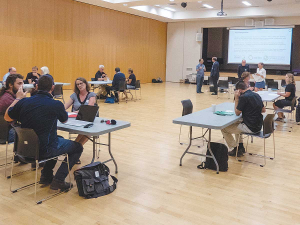Beef Progeny Test 2025: Genetic insights for NZ beef industry
At Pāmu’s Kepler Farm in Manapouri, mating has wrapped up at the across-breed Beef Progeny Test.
 Researchers Tommy Ley, far left, and Steve Breneger explain their project during the “speed dating” segment of an innovative event at Lincoln in which scientists presented updates into several research projects then had a series of face-to-face chats with journalists and others attending the event. Photo: Rural News Group.
Researchers Tommy Ley, far left, and Steve Breneger explain their project during the “speed dating” segment of an innovative event at Lincoln in which scientists presented updates into several research projects then had a series of face-to-face chats with journalists and others attending the event. Photo: Rural News Group.
State-owned farmer Pāmu has been able to reduce nitrogen input on its Waimakariri dairy farm while maintaining milk and grass production, by using fertigation – the application of fertiliser through irrigation.
The farm applied 42% less nitrogen last season compared with the previous season, while both grass and milk production remained comparable with past seasons, according to research by Lincoln University masters student Tommy Ley and Irrigation NZ’s technical manager Steve Breneger.
Pāmu installed the fertigation system on the farm in November 2018. Ley and Breneger are conducting a study into its effectiveness.
Grass production is similar and milk production up on previous years, said Breneger.
“The numbers are still stacking up that it’s actually being quite a positive move.”
The pair’s research is funded by the Sustainable Farming Futures Fund, with support from Ballance Agri-Nutrients, Fertigation Systems and Molloy Ag. They spoke at an innovative “The Secret’s In The Soil” presentation day at Lincoln, where nine different teams all presented updates into various research projects on the theme of irrigation’s effects on soil.
Ley and Breneger’s study aims to determine whether fertigation improves yield, nitrogen use efficiency and clover content in perennial ryegrass/white clover pastures, and whether it has lower nitrogen losses, compared with conventional fertiliser.
Their study included two experiments at two different sites using fixed amounts of fertiliser, as well as the farm-scale trial at Pāmu.
Ley said fertigation allowed farmers to apply fertiliser when it was needed, in a liquid form, and more frequently.
“It essentially means you can maintain lower constant nitrogen in the soil. Therefore you’re going to reduce the amount of total nitrogen losses you can possibly get from the pasture.”
Fertigation was commonly used in horticulture systems, but there was a lack of literature into its use in pasture, he said.
Breneger said that like all the big corporates, Pāmu was looking at how to achieve the reductions in N-leaching they have to make over the next few years.
Installing their fertigation system was more about tailoring it to be sustainable, not just increase yield or milk, he said.
The system chosen by Pāmu uses a 30,000 litre nurse tank near the shed, and then a 5,000l trailer which is towed to the base of each pivot as required.
Alternative systems might use pipelines to each pivot, which would be the high capital cost option, or individual fixed tanks at each pivot, which would mean frequent on-farm access by non-farm staff.
Coming in at a year-end total at 3088 units, a rise of around 10% over the 2806 total for 2024, the signs are that the New Zealand farm machinery industry is turning the corner after a difficult couple of years.
New Zealand's animal health industry has a new tool addressing a long-standing sustainability issue.
The Government has announced that ACC will be a sponsor of this year's FMG Young Farmer of the Year competition.
As veterinary student numbers grow to help address New Zealand's national workforce shortge, Massey University's School of Veterinary Science is inviting more veterinary practices to partner in training the next generation of vets.
South Island dairy farmers will soon be able to supply organic milk to Fonterra.
Norwood has announced the opening of a new Tasman dealership at Richmond near Nelson next month.